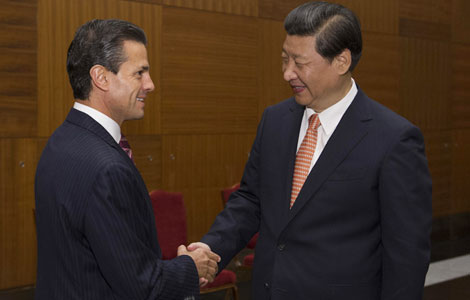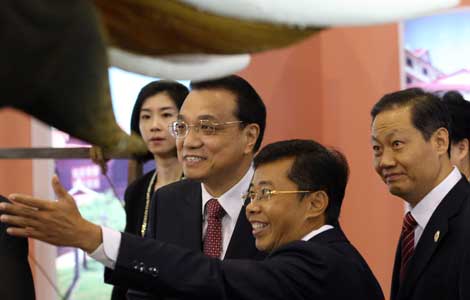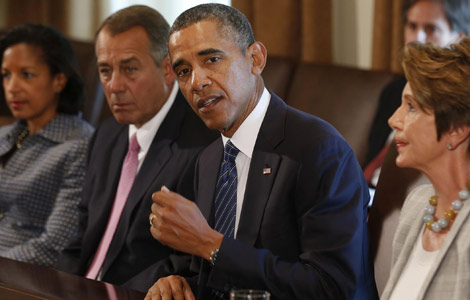Sinopec oils the wheels of overseas growth
Updated: 2013-09-05 07:24
(China Daily)
|
||||||||
Energy | Mike Bastin
It will come as no surprise that China Petrochemical Corp, also known as Sinopec, has agreed yet another deal with an overseas oil producer. Sinopec's recently announced 33 percent stake in the Egypt-based oil and gas business of US firm Apache Corp will cost $3.1 billion.
Only last year Sinopec also concluded a $1.5 billion deal with Canada's Talisman Energy Corp and, since late 2010, Sinopec has invested $19 billion in deals across Europe, the United States, South America and Australia.
These deals are essential "fuel" for China's continued economic development. China is the world's second-largest user of oil, behind the US, so securing imported energy supplies is key to meeting growing domestic demand.
However, it is a surprise to see little or no discussion and analysis of Sinopec's overseas expansion strategy. The key reason behind which such success continues internationally and from which many of China's increasing number of international companies can learn are important lessons.
Back in 2005, China National Offshore Oil Corp launched a takeover bid for the US oil giant Unocal Corporation. Considered by many at the time to be an audacious, even reckless, strategic maneuver, it came as no surprise that the acquisition failed. Political objections led to the withdrawal of the $18.5 billion bid. Unocal's purchase was considered by many on Capitol Hill to represent a threatening takeover of strategic assets important to the US national interest.
Since then Sinopec has used this "failure" to learn important business strategy lessons. Takeovers of Western energy providers no longer feature in Sinopec's expansion strategy. Partnerships and alliances appear to have replaced this more risky and often threatening form of growth.
Sinopec's senior management team appear fully appreciative of the often political sensitivities that accompany energy industry acquisitions. Acquisitions, often perceived as hostile by the target takeover company and many other important stakeholders, require substantial sunk investment even before the most challenging cross-cultural working issues post-acquisition cultural integration begins.
On the other hand, partnerships and alliances, while still offering significant expansion opportunities, offer a far less risky and far easier integration of corporate cultures and styles.
At a time when overseas expansion by Chinese companies is increasing, Sinopec's approach should not only be appreciated but also copied. Chinese companies, and not just Sinopec's fellow energy industry players, can learn important lessons from Sinopec's success over recent years.
Above all, growth via partnership leads to a far more sober, rational and, therefore, feasible and sustainable method of expansion. Growth by acquisition often leads to failure not just because of the complexities associated with the quantification of intangible brand value and cultural integration, but also because of the development of an overly ambitious and egotistical senior management. Emotion often trumps logic when a company's leaders eye ever enticing and increasing short-term financial gain via aggressive takeover action.
The likelihood of success through partnership, rather than takeover, will always be higher given the less hostile and often complementary nature of this approach.
More than a few Chinese companies now find themselves with the financial muscle necessary to barge their way into more lucrative European and American markets via the acquisition of a well-known, respected foreign brand. Sinopec's measured, gradual approach to expansion via partnerships, therefore, represents an extremely important route from which these companies can begin to plot a similar, sustainable strategy for overseas expansion.
Sinopec's long-term, cautious approach is a model of overseas expansion that many Chinese companies would be foolhardy not to replicate.
The author is a visiting professor at the University of International Business and Economics in Beijing and a researcher at Nottingham University's School of Contemporary Chinese Studies.
(China Daily 09/05/2013 page17)
Most Viewed
Editor's Picks

|

|

|

|

|

|
Today's Top News
US faces substantial losses if Egypt aid halted
Bank of America finally exits CCB
S. Korea a model for innovation: experts
Xi, Putin meeting to focus on 'mega projects'
US divided over Syria attack
Ex-railway deputy chief pleads guilty
Deal ensures supplies of natural gas
Writers sue Apple for compensation
US Weekly

|

|














